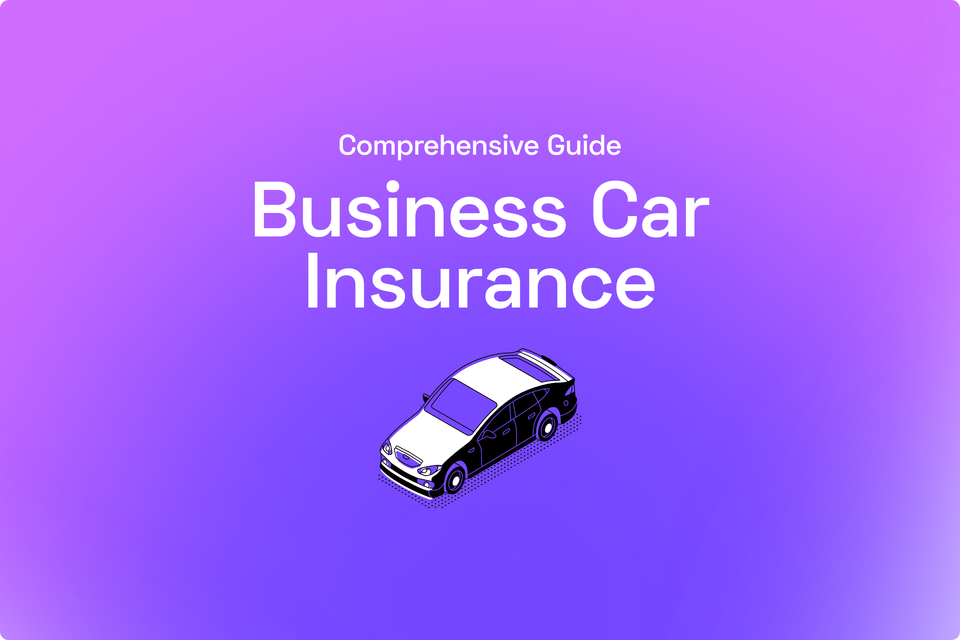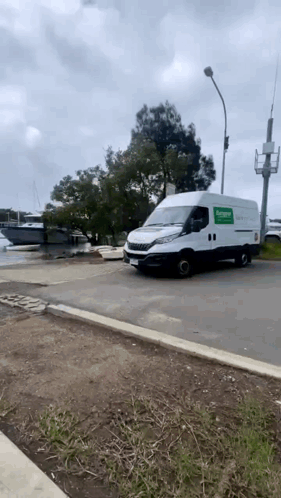Comprehensive Guide: Business Car Insurance

Business car insurance is a crucial aspect of any company's risk management strategy. As commercial vehicles are oftentimes used for various tasks that differ from personal use, traditional auto policies may not provide the necessary coverage.
This is where commercial vehicle coverage comes into play, as it is specifically designed to address the distinctive needs of businesses. Fleet insurance provides coverage for a large number of vehicles used by a company, while corporate car insurance suits organizations that provide vehicles to their employees for work purposes. Business car insurance is not one size fits all, and it is important for companies of all sizes to obtain the right type and amount of coverage to protect their assets and employees.
Understanding the nuances of commercial vehicle coverage can be challenging, but with the help of a qualified insurance professional, businesses of all sizes can secure policies that meet their specific needs. By taking the time to obtain comprehensive business car insurance, organizations can have the peace of mind that comes with knowing that their vehicles are protected in the event of an accident or other unforeseen circumstances.
Section 1: Understanding Business Car Insurance

Business car insurance, also commonly known as commercial vehicle coverage, fleet insurance, or corporate car insurance, is insurance designed to cover the vehicles and drivers associated with a business rather than for personal use.
The key difference between business car insurance and personal car insurance is that the former is designed to protect a company's assets, employees, and vehicles, whereas personal car insurance is intended to protect individuals and their personal vehicles. When it comes to business car insurance, there are several types of coverage available, including liability, collision, comprehensive, and uninsured motorist coverage. Liability insurance is the most basic coverage, which covers the cost of damages or injuries that the driver may cause to others on the road. Collision insurance covers the cost of damage to the vehicle in case of an accident, while comprehensive coverage covers losses due to theft, vandalism, or damage from natural disasters.
Finally, uninsured motorist coverage provides protection in the event of an accident with a driver who doesn't have insurance. Given the complexities involved in business car insurance, it is always advisable to work with an experienced insurance provider to ensure that your business has the right coverage in place to protect itself in case of an unexpected incident.
Section 2: Who Needs Business Car Insurance?
When it comes to businesses that require commercial vehicle insurance, the scope is relatively broad. Virtually any company that utilizes vehicles in their day-to-day operations can benefit from this type of coverage. From catering companies that deliver food to events, to construction teams that haul equipment and supplies, there are a variety of scenarios that can make commercial vehicle insurance necessary.
However, the types of coverage and considerations will vary depending on the size and scope of the business. For instance, small enterprises may only need coverage for one or two company cars, while large corporations with fleets will require extensive fleet insurance policies.
When choosing the appropriate commercial vehicle coverage, companies must also consider factors such as the type of vehicle being utilized, the number of drivers on the road, and the geographical region where their operations take place. With these considerations in mind, businesses of all sizes can ensure they have the corporate car insurance necessary to navigate the roads safely and effectively.
Section 3: Assessing Your Business’s Insurance Needs

When assessing your business's insurance needs, it is crucial to evaluate the specifics of your business size, vehicle usage, and risk exposure. The first step is to identify the type of coverage required for your business car insurance, including commercial vehicle coverage, fleet insurance, or corporate car insurance.
The decision on the type of coverage will depend on the size of your business, the number of vehicles you have, and the frequency of usage. Accurately assessing the value of your vehicle and the usage patterns is also critical in determining the appropriate insurance policy.
Many businesses owners overlook this crucial step, but it can save you money in premiums in the long run. Furthermore, it is important to factor in the risk exposure of your business when choosing insurance coverage. Having adequate insurance can provide significant peace of mind knowing that your business is protected in the event of an adverse event.
Section 4: Factors Affecting Business Car Insurance Premiums
Commercial vehicle coverage or business car insurance is a significant investment that ensures the safety and security of your fleet. It goes without saying that the cost of this essential protection can weigh heavy on your purse strings. However, understanding the factors that affect insurance premiums can help you make informed decisions for potentially lowering costs.
One of the most significant contributors to insurance premiums is the type of vehicle being insured. A detailed assessment of the model, make, and year of your vehicles, along with an understanding of the applicable safety ratings, can yield optimum insurance rates. Another crucial aspect is the driving history of your employees, as this can significantly impact the chance of insurance claims or accidents. Claims history is another decisive factor, as even a single reported incident can increase your premium rates. In addition to these factors, the location of your business, the type of industry, and the use of vehicles play a significant role in determining insurance premiums.
As a business owner, it's important to strike a balance between minimizing insurance premiums and ensuring adequate protection of your fleet. Implementing strict safety and driving policies, installing surveillance cameras in the fleet vehicles, and conducting regular employee training programs can contribute to the overall reduction in insurance costs. It's also essential to establish an excellent working relationship with your insurance provider and keep tabs on the market for emerging trends and competitive pricing. Approaching corporate car insurance with an analytical and authoritative mindset and taking proactive measures often pays dividends in the long term, making it a critical component of any sound business plan.
Section 5: Fleet Insurance for Multiple Vehicles

Businesses that own and operate multiple vehicles understand the importance of protecting their assets. Fleet insurance, also known as commercial vehicle coverage or corporate car insurance, is designed to meet the specific needs of companies that rely on multiple vehicles to keep their operations running smoothly.
One of the most significant advantages of fleet insurance is the ability to customize policies to meet the unique needs of the business. Whether it's comprehensive coverage for a large fleet or liability insurance for a small group of vehicles, fleet insurance can be tailored to fit each company's requirements. Furthermore, effective fleet management is vital to the success of any business, and fleet insurance is an integral part of that process.
By ensuring that all vehicles are adequately insured, businesses can minimize risk and protect their bottom line. Overall, fleet insurance is a smart investment for businesses that operate multiple vehicles as it provides comprehensive coverage, tailored policies, and the assurance that all vehicles are appropriately protected.
Section 6: Additional Coverage Options and Endorsements
As a business owner, ensuring your corporate car insurance has the necessary coverage to meet your unique business activities is crucial. Beyond the standard coverage, there are additional coverages and endorsements that can provide added protection for both your drivers and the goods they transport.
Rental reimbursement, for example, can help mitigate financial loss when a covered vehicle is out of service due to a covered loss, ensuring your business can continue to operate even if your vehicles cannot. Roadside assistance can provide valuable support for your drivers who may become stranded on the side of the road while on company time. Furthermore, coverage for goods in transit offers protection for your business assets while in transport, a must-have for companies that transport high-value goods.
These additional coverages should not be overlooked, as they can provide significant protection for your company's assets and operations. Ultimately, investing in commercial vehicle coverage, fleet insurance, and the additional coverages and endorsements can provide peace of mind and security for your company's vehicle-related operations.
Section 7: Claims Process and Management

The claims process for business car insurance is a crucial component of commercial vehicle coverage. It is imperative that fleet owners and corporate car insurance holders understand the process to ensure they can efficiently manage and mitigate potential accidents.
Accidents involving professional drivers can be complex and expensive, and it is essential that business owners maintain an efficient and effective claims management strategy to minimize the impact of these incidents. To manage business car insurance claims effectively, fleet owners should be aware of the documentation required and the timelines set for claims processing.
Efficiency in claims management also involves prompt notification and gathering of evidence, as well as maintaining an excellent system for tracking claims status and progress. By understanding the claims process and implementing best practices for claims management, business owners can minimize losses and ensure their commercial vehicle coverage is maximized.
Section 8: Legal and Regulatory Considerations
Commercial vehicles are a significant investment for any business, and proper insurance coverage is crucial in mitigating financial risk. In order to navigate the legal and regulatory considerations of insuring business vehicles, companies must be aware of their state-specific requirements and ensure compliance with any pertinent laws.
Beyond basic coverage, commercial vehicle policies may offer additional options such as fleet insurance or corporate car insurance to further secure a business's resources. Carriers that offer business car insurance understand the unique needs of companies, and can offer policies that address any potential risks and liabilities. By prioritizing thorough coverage and staying informed on regulatory changes, businesses can confidently protect their assets and operate with greater certainty.
Section 9: LUNA’s Role in Business Car Insurance

Commercial vehicle coverage is vital for businesses that require a fleet of cars for routine operations. However, navigating the world of business car insurance can be a daunting task for business owners who lack the necessary expertise and knowledge.
This is where LUNA's role in business car insurance comes in handy. LUNA combines innovative app technology and expert services to offer businesses a hassle-free experience when it comes to finding suitable coverage and managing insurance costs. LUNA's expertise in business car insurance can enable companies to save an average of $597 per year on auto insurance while providing adequate coverage.
Through LUNA's round-the-clock connection with licensed professionals, businesses can easily navigate the commercial vehicle insurance world and access all their policies in one place. Whether you require fleet insurance or corporate car insurance, LUNA has got you covered. By leveraging LUNA's services, businesses can streamline the insurance procurement and management process, ultimately saving them plenty of time and money.
In today's world, most businesses rely on vehicles to operate. Since accidents can happen at any time, having commercial vehicle coverage is important to protect companies from financial losses. Corporations, small businesses, and sole proprietors may all require business car insurance, which can often be tailor-made to meet specific needs. Assessing a business's insurance requirements is essential for identifying the right coverage, determining the appropriate level of protection, and managing costs. Factors that impact premiums include vehicle type, driving history, location, and coverage amounts required.
Fleet insurance is ideal for companies with multiple vehicles, streamlining the insurance process and potentially offering better rates. Businesses can also opt for endorsements and additional coverage based on their specific needs. In the event of any accidents, having a clear and efficient claims process is paramount. From complying with legal and regulatory requirements to minimizing damage, LUNA plays a crucial role in securing and managing business car insurance, providing tailored solutions to meet every business's needs. Overall, having business car insurance ensures that companies can continue to operate with peace of mind, knowing that in the event of accidents or mishaps their financial interests are protected.
